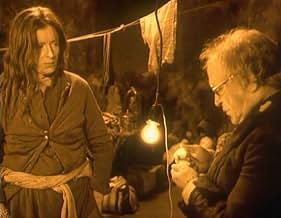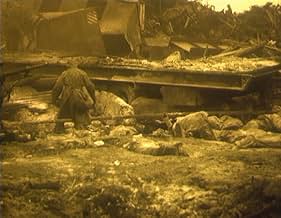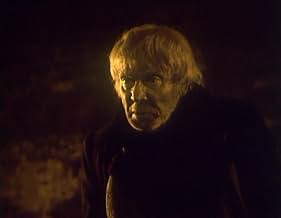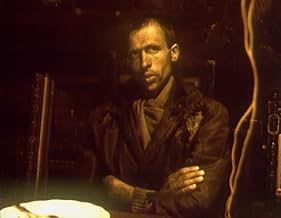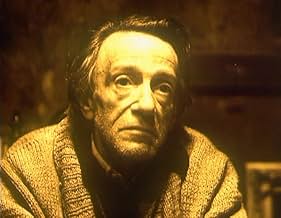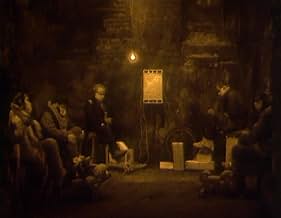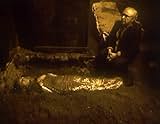Pisma myortvogo cheloveka
- 1986
- 1h 27min
Tras el holocausto nuclear, un grupo de intelectuales trata de encontrar esperanza en el pálido e incoloro nuevo mundo. Entre ellos, un profesor de historia intenta contactar por carta con s... Leer todoTras el holocausto nuclear, un grupo de intelectuales trata de encontrar esperanza en el pálido e incoloro nuevo mundo. Entre ellos, un profesor de historia intenta contactar por carta con su hijo desaparecido.Tras el holocausto nuclear, un grupo de intelectuales trata de encontrar esperanza en el pálido e incoloro nuevo mundo. Entre ellos, un profesor de historia intenta contactar por carta con su hijo desaparecido.
- Dirección
- Guionistas
- Elenco
- Premios
- 1 premio ganado en total
- Khyummel-otets
- (as I. Ryklin)
- Anna
- (as V. Mayorova)
- Pastor
- (as V. Dvorzhetskiy)
- Tereza
- (as S. Smirnova)
- Vrach
- (as Ye. Platokhin)
- Dirección
- Guionistas
- Todo el elenco y el equipo
- Producción, taquilla y más en IMDbPro
Opiniones destacadas
The nuclear catastrophe, we are told, happened by accident. Most of the few remaining survivors are physically or mentally sick, going about zombie-like, and slowly dying off in a few dimly lit underground shelters. The situation above ground is even worse, with high-radiation, wreckage, rubble, strong winds and little light (some kind of "nuclear winter"), rotting corpses everywhere.
The main character is an old scientist who tries to preserve some sense of purpose, inter alia by continuing his work and by writing letters to his missing and most likely dead son, letters that are not sent because there is no address to send them to. The acting by R. Bykov who plays the scientist, is impeccable, and the same goes for the rest of the cast, although it seems out of place to think and comment on these matters in a film dominated by sheer horror.
The limited colour gamma used (mostly dirty ochres, greys and blacks) effectively reinforce the feeling of oppression and hopelessness this film so effectively conveys from beginning to end.
Very hard and painful to watch, but perhaps necessary to get an idea of what our world could look like, were we to use the horrific weapons we have created. Did in fact look like, for some, when these weapons were used at the end of WWII.
Letter from a Dead Man, established amidst the panic of a nuclear holocaust, the result of the irrational arms escalation with which the United States and the Soviet Union were putting pressure on each other and which threatened to transform life on our planet into something impracticable. However, the accident at the Chernobyl plant, which occurred five months before the premiere of this film, determines its most obvious message.
The panic to lose everything is definitely achieved, to reset the historical evolution of one single action, to forget the identity of species and break the commonly admitted social contract was identical in capitalism and socialism, especially because it was the common sense of the ordinary citizen who was demonstrating in pursuit of a understanding. What was the point of mutual annihilation, if no one would emerge victorious from the final battle? What is the goal of total domination, if there is nothing left to dominate? What is the meaning of the will to try to impose your own model, if the future is nothing more than a barren terrain lined with rubble?
But despite the uncompromising staging of the film, Konstantin Lopuschanski retains, maybe naturally, a humanistic core. Aside from the anti-nuclear aspect, "Letter From a Dead Man" is a haunting reminder for reason, in the resolute emphasis on human humanity, which ultimately represents a final anchor of hope. Therefore, the film closes with a quote from the infamous 1955 "Russel Einstein Manifesto" against nuclear war: "There lies before us, if we choose, continual progress in happiness, knowledge, and wisdom. Shall we, instead, choose death, because we cannot forget our quarrels? "
The protagonist and his fellow sufferers are constantly preoccupied with questions about humanity, about the conditions of the human race and the absurdity of war. A resident of the museum bunker, for example, dictates a pathetic pamphlet to his secretary about the fatality of the civilization process in the machine, marked by deep disgust for progress and the awareness of the ultimate end of humanity - as a testament for subsequent civilizations. "Mankind was a tragic species, doomed perhaps from the very beginning." One of the roommates expresses his deep love for humanity in a farewell prayer shortly before his suicide; "Love created art, an art which reflects our unbearable yearning for perfection, our immense despair, our endless cry of terror..."
there is a also a great thought-provoking scene where the professor (the protagonist) remembers his childhood nightmare; when he was frightened by a big locomotive; and now it seems to him that it was he - with his inventions - who created the giant locomotive that overran humanity: and his most terrible dream is the one in which he sees his son on the rails...
Finally the professor tells his prodigal son the story of his fears, dreams and research, all of which together expresses one thing: his ambivalence between hope and self-abandonment, which characterize his whole situation and the essence of the movie. The movie also gives more suggestion to an existentialist and humanistic side that states that the face of death is not scary anymore given that everything has perished. And that hope can still be found in youth as the only remaining symbol of innocence, and that it is impossible to imagine that humanity will be wiped out permanently from the face of the earth.
Lopushansky assisted Tarkovsky during the production of Stalker - and that influence is clearly visible in every shot. that is its: sepia tones, long, static shots or slow driving on the landscape, melancholy intonation of caring questioning about where modern man is heading imbued with religious faith, etc. Visually, almost the entire film is coloured of sepia, brown-black, a ugly, grainy, 'dirty' sepia. it's not that high-contrast, sharp and somehow 'beautiful' sepia of STALKER. This is a film about a world that has driven itself to the grave, with a slow, elegiac, torturous atmosphere, it shows the last twitches of a man's futile attemps to save humanity.
But given all these great quotes etc, the movie's plot, in the beggining, is hard to grasp and many big factors in the film is not understandable at first. Thus it have a relatively poor structure and narrative.
If you find this film, take your time any rainy day, and drift away in a world of dead and dying.
This movie is a warning. It is scary to think how many times the world was on the verge of the Apocalypse. Not the divine Apocalypse, but one that can fly on the wings of a rocket launched by a foggy enemy.
Rolan Bykov, I was once again convinced of this, one of the best actors of Soviet cinema. He so organically played the role of the "Dead" ... well, what can I say? Master!
The letters that the hero of Bykov (incidentally, a professor who received the Nobel Prize) writes to his late son, only reinforce the already gloomy atmosphere of the film.
But, nevertheless, there is some optimism in the film. What can not but rejoice. However, I was insincere when I said that the film sucked all the positive emotions out of me. One more thing remains: hope. Part of me hopes that one day we will wake up and the world will no longer have nuclear weapons. But the other part, however, understands that a world without nuclear weapons is the world that is discussed in this film. This is a world in which there is nothing that holds back human destructive nature.
A scary movie ... hopefully not prophetic.
<b id="_d">...</b>
¿Sabías que…?
- TriviaThe filmmakers took great care to continuously remind their viewers that what they're seeing is not happening in the Soviet Union. To ensure this, a lot of foreign items have been placed in the backgrounds which surely immediately caught the eye of the contemporary viewer. There is not a single object with Cyrillic letters, but there are plenty with English ones. Many items are Western consumer goods which were rare in the Soviet Union in the 1980s. Particular examples are beer cans and a bottle of Jagermeister on a desk. The weapons the soldiers wield are also not even resembling Soviet rifles which would've been familiar to all viewers who completed their military services. They look more like a strange "crossbreed" of American M-16 and M-1 rifles. The vehicle the soldiers are using is a MAZ missile trailer truck, but the same vehicle was also built for the civilian market and sold to many countries. The helicopter that shows up in one of the scenes is a Kamov Ka-26 which was never used by the Soviet military (and in fact only one Warsaw Pact country did, Hungary). The hovercraft that is seen turning and leaving is also not a (known) military vehicle, but anyone in the 1980s should've associated the image with the air-cushion ferries on the English Channel which were a famous and novel technical achievement at the time.
- Citas
Unknown: We should acknowledge the fact that the whole history of mankind is a story of a slow suicide commited by a living matter that by sheer accident acquired the abilty to think, but that did not know what to do with this fateful capacity. Full stop.
Selecciones populares
- How long is Dead Man's Letters?Con tecnología de Alexa
Detalles
- Tiempo de ejecución1 hora 27 minutos
- Color
- Mezcla de sonido
- Relación de aspecto
- 1.37 : 1
Contribuir a esta página


